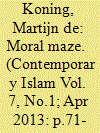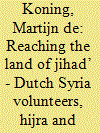| Srl | Item |
| 1 |
ID:
119174


|
|
|
|
|
| Publication |
2013.
|
| Summary/Abstract |
The Salafi movement presents itself as a moral guardian of Muslims in a world that, according to many, is filled with moral crisis, temptations and anti-Islam tendencies. Salafis claim that it is essential to return to the community of the pious forefathers seen as the most outstanding community of all times with the highest absolute moral standard. In this article I will show how individual participants engage with this idea of a moral community of believers yet remain vulnerable to the ambiguities and ruptures inherent in everyday life and within the Salafi movement. By exploring how Salafis passionately try to search for the 'correct' knowledge and strive to maintain a unity between knowledge, conviction and behavior, and the role of friendships therein, I argue that Salafism does not remain separate from the troubles of everyday but that these issues enter into and exist in Salafi thought and practice, not by being resolved but by being transformed into personal struggles. These ambiguities and ruptures may cause problems but also provide an incentive for Salafis to continuously work at the self-improvement of one's piety, authenticity, and sisterhood and brotherhood.
|
|
|
|
|
|
|
|
|
|
|
|
|
|
|
|
| 2 |
ID:
178043


|
|
|
|
|
| Summary/Abstract |
The topic of hijra is very much present in the ideological messages of IslamicState and Al Qaeda as well as in many studies exploring why and how people are motivated to join the violent struggles in Syria. Yet, with a few exceptions, many studies mention hijra as something self-evident without exploring the meanings attached to hijra among the volunteers who joined Al Qaeda and/or IS. Based upon ethnographic work among Dutch Islamic militant activists of the Behind Bars network constituting a very vocal early contingent of male Syria volunteers, this article explores the meanings of hijra. I will show that ideas about hijra were essential to the construction of their departure narratives and examine how hijra for them, in different and sometimes contradicting ways, became a pathway to an ethical and political transformation. One which was, at the same time, being instrumentalized to strengthen the very type of governance they tried to escape.
|
|
|
|
|
|
|
|
|
|
|
|
|
|
|
|